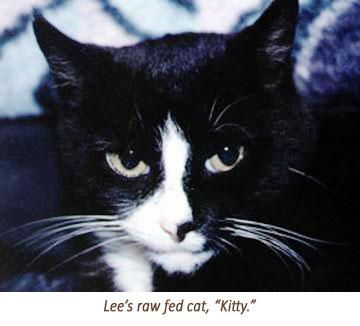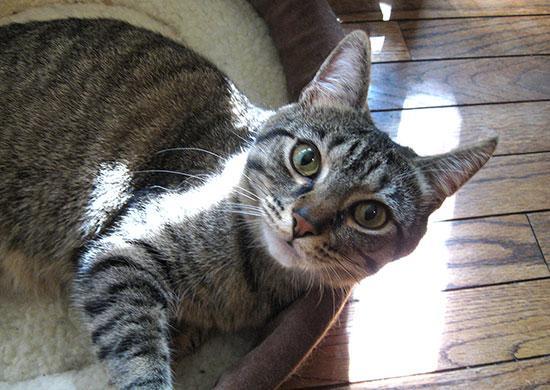This content is archived from the Feline Nutrition Foundation
When a Vegetarian Feeds A Raw Diet
- Updated: Saturday, June 01, 2019 05:43 PM
- Published: Saturday, May 23, 2009 03:57 PM
- Written by Lee Ellis
I came to raw feeding strictly by accident. I had a cat named Kitty who showed up at our house one day. She was strong and healthy, ate birds and mice, and we decided we would adopt her. We brought her inside, vaccinated her and fed her kibble. Over time, her stool was the consistency of pudding; her appetite was voracious but she was losing weight. I took her to our vet and he put her on antibiotics for a couple of weeks, which didn't help. I searched but could not find anything on the internet to help cats with inflammatory bowel disease. I ended up creating an internet support group for people whose cats had this problem.
I turned to a local holistic vet who suggested raw food, something I'd never heard of. At this point in my life, I had been a vegetarian for three years for ethical reasons and did not want to go anywhere near the meat department or butcher shop again. The thought of having raw meat in my fridge, let alone feeding it to my cat, was repulsive! One of the vet techs came in to talk to me because she had a cat with diarrhea. When she switched him over to raw food, the diarrhea disappeared. She too was a vegetarian so I thought if she could do it, I could try it. If it didn't work, we were looking at putting Kitty on steroids and possibly having an endoscopy done. My vet's office was just beginning to carry pre-packaged and complete raw diets, so all I had to do was thaw and serve. So away I went, armed with a few containers of raw food and a sick feeling in my stomach.
Right from the start, Kitty was thrilled. I thought there would be an explosion of diarrhea but she actually had the first normal poop in years. Within a week, she was almost at her normal weight and was much calmer. I was shocked; I really couldn't believe how easy it was to turn her back into a healthy cat. Not only did she eat complete, ground raw food meals but also would eat chicken wings. I reported our good news back to the IBD group and it really helped many other cats, and continues to do so almost 10 years later.
Then I realized I couldn't just raw feed Kitty; I needed to feed my other pets raw too.
 Everything had changed because I had had one sick animal. I joined a buying co-operative with other raw feeders. I steeled myself and went to the grocery store's bulk giblet sale, picking out all the chicken hearts. I finally convinced a pet food store owner I had known for 20 years to carry raw frozen foods at his store. Once he started feeding raw to his pets – dogs in this case – he reported major personality changes, all positive. I know many breeders of both dogs and cats who require people to sign a contract that they will only raw feed their new puppies or kittens, and will take the animal back if she finds out the new owners have violated that agreement. And, I have helped convince other vegetarians to feed raw to their cats by helping them to understand that it is the natural diet for carnivores.
Everything had changed because I had had one sick animal. I joined a buying co-operative with other raw feeders. I steeled myself and went to the grocery store's bulk giblet sale, picking out all the chicken hearts. I finally convinced a pet food store owner I had known for 20 years to carry raw frozen foods at his store. Once he started feeding raw to his pets – dogs in this case – he reported major personality changes, all positive. I know many breeders of both dogs and cats who require people to sign a contract that they will only raw feed their new puppies or kittens, and will take the animal back if she finds out the new owners have violated that agreement. And, I have helped convince other vegetarians to feed raw to their cats by helping them to understand that it is the natural diet for carnivores.
Since 2002, I've been a professional pet sitter/dog walker, and many of my clients are raw feeders. There is such a difference between them and their kibble-fed counterparts. The raw-fed pets don't have eye discharge like many kibble-fed dogs do. Their coats are shinier and not at all greasy. While many kibble-fed dogs have huge, smelly feces, raw-fed dogs have small feces with minimal smell. I found this with my own pets over the years, and continue to see it with clients' pets, both dogs and cats.
My wish is that the vet schools would start taking raw food seriously. This isn't a fad and it's not going away. But what happens when our raw-fed pets need their diets modified due to a medical condition? My current cat, Molly, just had a wellness test done. Her creatinine is slightly outside of normal. My current vet doesn't know much about the raw food diet, so she can't guide me. If I do have to modify Molly's diet, I'll have to figure it out on my own, but at this time I don't know of any raw food companies that put out diets for specific illnesses or ailments.
Additional Reading
Duke's Story: Inflammatory Bowel Disease
Saving Alistair: How Lyn Thomson Helped Stop IBD 11,000 Miles Away
I'd love to see separation between the vet schools and kibble companies, especially those that sell their foods exclusively through vets and label it "prescription." It's misleading to pet owners who think that because their vet sells the food, it must be the best quality. Since most people trust their vets, they don't read the labels and don't ask questions about by-products and other questionable ingredients.
After switching Kitty and the rest of my pets over from kibble to raw, I realized how important it was to feed them food they were made to eat, not over-processed, grain-laden food. Doctors and dietitians are always telling people to eat more fresh, less processed foods and it's the same for our pets.
Lee Ellis runs Three Star Pet Sitting Services in Toronto, Canada, and shares her house with Molly the cat.





